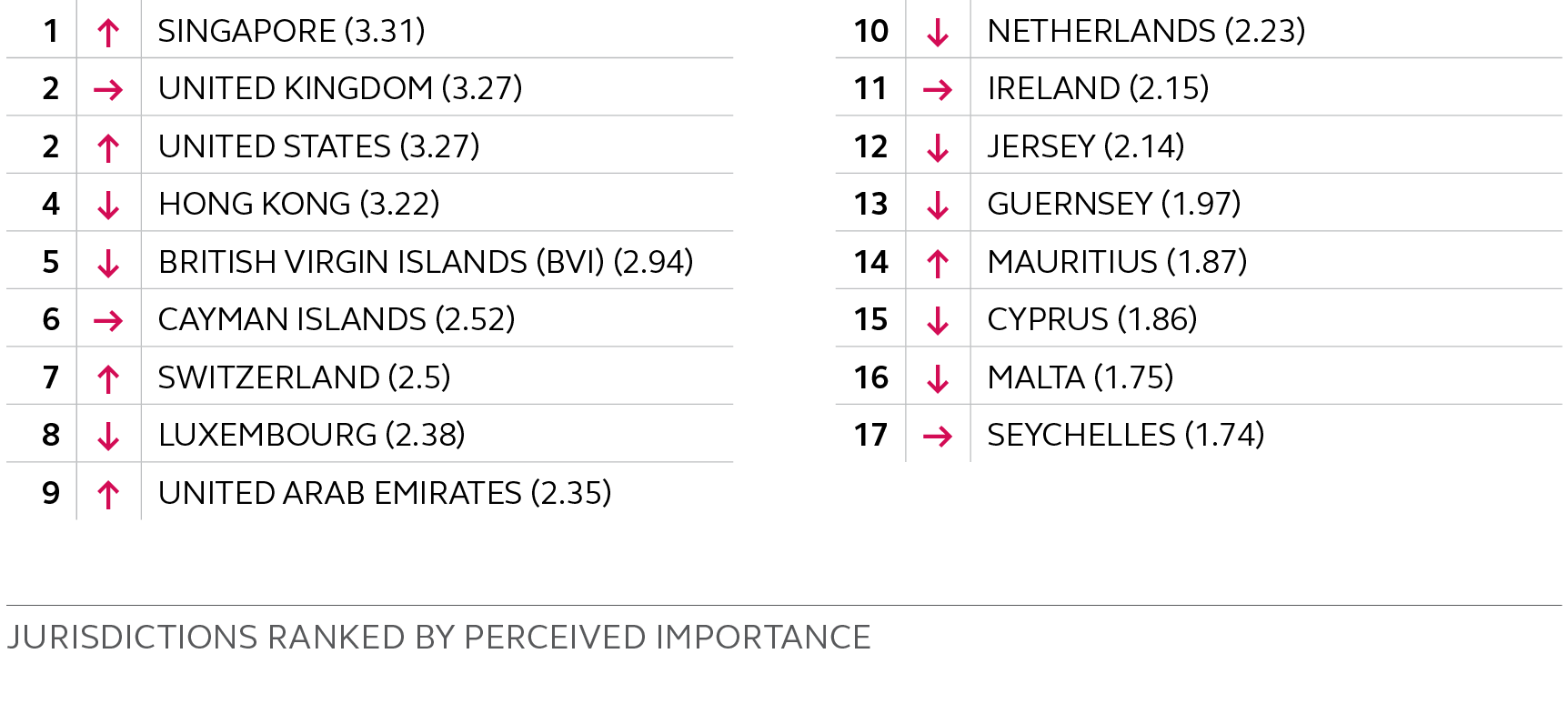
Is Singapore nudging ahead of Hong Kong as Asia’s preferred financial hub?
Singapore has leapfrogged Hong Kong for the first time in Vistra’s latest global jurisdiction rankings, which asked 620 corporate services executives to rate the importance of financial centres. Could this signal a long-term shift in the balance of power between Asia’s dominant business hubs?
Hong Kong and Singapore have long engaged in healthy competition as the dominant midshore financial centres serving as the global gateway to Asia.
Since 2010, when Vistra began its jurisdiction rankings – where corporate services1 respondents rate the importance of global financial centres – Hong Kong has been the more dominant of the two. In this year’s research, Singapore rose to top spot in the rankings alongside the UK and the US, while Hong Kong has fallen into fourth place.
It is a marginal advantage: 46% of our respondents rated Singapore as a highly important financial centre for their organisation, versus 43% that said the same about Hong Kong. But it is the reversal of fortunes between these close rivals that is important in understanding the future trajectory of each.
How the tables turned
The current political turmoil afflicting Hong Kong may be helping Singapore to gain traction with Asia’s wealthy, based on Vistra’s latest rankings.

“People are rethinking their exposure to Hong Kong, and Singapore has become massively important over the last 12 months,” says a partner at a Hong Kong-based law firm. “It’s an island of calm in very turbulent waters,” says a UK-based private wealth lawyer.
Singapore’s ascent should not be wholly attributed to the recent turbulence, however. The city-state’s government deserves credit, too.
Singapore has been proactive in increasing its attractiveness for activities such as fund management and wealth planning.
In 2018, Singapore introduced a new investment fund structure, the Variable Capital Company (VCC), to increase its attractiveness as a domicile for alternative funds.
The VCC offers more flexibility to investors, operational cost savings and tax advantages, positioning it to challenge leading fund domiciles such as the Cayman Islands.
Singapore has been trying to attract a greater share of Asia’s growing high net worth clients in recent years, too. Its trust laws offer confidentiality to settlors and beneficiaries, as well as tax exemptions.
“A lot of trust companies are opening up in Singapore now. The international ones too – the ones we're used to seeing in Jersey – which we perhaps didn’t see there a few years ago,” says the UK-based private wealth lawyer.
Hong Kong bruised but not broken
It would be premature to write off Hong Kong as a preferred global hub – and certainly not as the preferred destination for China outbound.
Ties between China’s wealthy and Hong Kong are deeply embedded. More than half of Hong Kong’s estimated private wealth of over US$1 trillion is thought to be from mainland individuals1. And, as political uncertainty has heightened during 2020, mainland Chinese money flowing into Hong Kong stocks has increased: US$35.3 billion of Hong Kong-listed shares were acquired up to the end of May, beating the same period in 2018 and 20172.
Unlike Hong Kong, Singapore is not integrated into China’s economic system and it cannot boast the same level of convenience for Chinese clients seeking to move money abroad. “While I think the recent disruption may have made Hong Kong slightly more unfavourable, it’s nowhere near as much as I expected,” says a tax consultant in the Hong Kong office of an international law firm. “We're still getting the same sort of inquiries and the same sort of work as before.”
Singapore has not yet been able to build the same level of trust with Chinese clients as Hong Kong either, according to the tax consultant. “Mainlanders are more attuned to dealing with people in Hong Kong and they’re more comfortable with the court system here,” he says.
Hong Kong also stands to gain from the EU’s introduction of economic substance rules, which target the Crown Dependencies and British Overseas Territories. “If a client doesn’t fall into one of the exemptions, then they’re more likely to move an entity to midshore or onshore,” says a Shanghai-based lawyer, who advises entrepreneurs and wealthy families. “Hong Kong would be higher up on the list than Singapore.”
Furthermore, in March this year, Hong Kong introduced a bill for a Limited Partnership Fund regime, establishing a vehicle designed specifically for the needs of private equity funds. Its government is also considering potential tax concessions in respect of carried interest for private equity funds.
Global perceptions of Hong Kong have undoubtedly been altered and it must now adapt to a new reality, but as the gateway to China and a longstanding global financial centre, it will retain an important role internationally.
1 The Trust and Corporate Services industry provides expert advisory and administrative support to Fund, Corporate, Capital Market and Private Wealth participants across the globe; helping capital flow, protecting investors and safeguarding assets.










